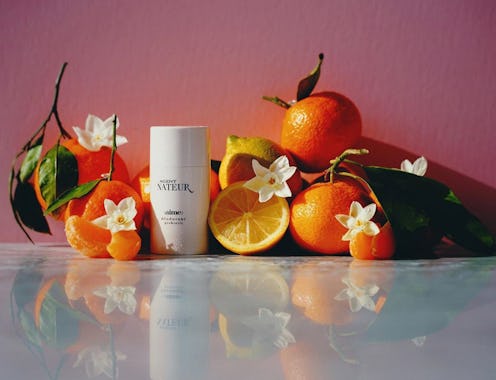(Beauty)
If Your Natural Deodorant Doesn't Work, You Need To Read This

Do you stink? Like, just a little, tiny bit? It’s OK, this is a safe space, you can admit it: You stink. I stink, too. It’s just part of being a human. Specifically, it’s part of being a human who recently switched from traditional deodorant to the natural stuff. "Does natural deodorant work?" you may be thinking. But a bit of B.O. doesn't mean your deo isn't working — it just means you’re in the throes of a pretty fascinating detoxification process.
Here’s what’s up: Conventional deodorant-antiperspirant formulations rely on aluminum to “plug” the sweat glands, which keeps you from sweating and blocks off odor, says Dr. Nadia Musavvir, N.D., a naturopathic doctor who specializes in skin health, in an email to The Zoe Report. Without that daily dose of aluminum, the pores in your pits “unplug” and start pumping out everything they’d been blocking off: aluminum, sweat, bacteria, all of it. While sweat itself doesn’t stink, odor-causing bacteria does — hence, why you may notice a certain, um, aroma when you make the switch to a non-aluminum formula. Don’t let it deter you. That stink is a sign your body is getting back to work.
So, why bother sticking out the slightly-smelly detox phase when your trusty, aluminum-powered, sweat-stopping antiperspirant never lets you down? For one, humans kinda, sorta need to sweat. “Skin is considered a detoxification organ,” Dr. Musavvir says, and sweating is its way of eliminating waste. Two, recent research has raised quite a few questions about the safety of aluminum. There is no proof the substance causes breast cancer or Alzheimer's disease, as has been reported, but it is “considered a genotoxin, a chemical that can cause changes to a cell that may lead to cancer, and a neurotoxicant, a substance that negatively affects the nervous system,” the naturopath says.
It’s worth noting that aluminum isn’t the only problematic ingredient in traditional deodorant. Other commonly used chemicals can cause issues, too; like BHT (a possible carcinogen that may accumulate in the body), propylene glycol (known for causing irritation), and fragrance (which may contain hormone-disrupting phthalates).
Once you eliminate these from the equation by opting for a cleaner formula, the body begins to re-regulate and, yes, maybe even stink. “I definitely had a detox period, but I am great now,” Katie Sturino, founder of personal care brand Megababe, tells TZR. (Same.) “The process usually takes around two weeks, and it's not as big of a deal as some people perceive.” Thanks to Sturino’s latest creation, it’s even less of a big deal: The founder recently launched the Megababe Happy Pits Underarm Mask to help customers effectively fast-forward through the funk.
“To ease the transitional phase, the main thing is to help get those toxins out,” Sturino says. “Charcoal is key. It acts like a magnet, pulling out bacteria, toxins, dirt, oil, you name it. Kaolin clay then holds onto all that stuff, so it doesn’t immediately get reabsorbed back into the skin. We also incorporated a blend of acids — glycolic, malic, and azelaic — to help lighten, brighten, and smooth the skin.”
Dermatologists agree that some of the above ingredients can, indeed, accelerate armpit detox. “Clay helps draw out excess oils by extracting contents of pores,” Dr. Michele Farber, M.D., F.A.A.D., a dermatologist with Schweiger Dermatology Group, tells The Zoe Report. “The mask mainly helps as a deep cleanse.”
Exfoliating acids are perhaps the most unexpected heroes of the natural deodorant movement. “Much like acne, which in part is the result of the action of bacteria on the skin, underarm odor is caused by bacteria that thrives in the ideal environment — a combination of sebum secreted by the body through the pores, and warm, moist air,” Dr. Alicia Zalka, M.D., F.A.A.D., tells TZR in a press release. The dermatologist just released her own “first-to-market fruit acid-powered deodorant,” Surface Deep Anti-Odorant, packed with glycolic acid. “By uniting the potent odor prevention effects of alpha-hydroxy acids with an easy-to-use pad, we are reimagining healthy hygiene from a clean skin care standpoint,” she says.
A slew of new probiotic formulas offer an inventive approach to addressing odor-causing bacteria, too, including Agent Nateur’s (Aime) Deodorant Probiotic and LaVanila’s The Healthy Probiotic Deodorant (available in February). “While in theory, probiotics may help shift bacterial flora to help with armpit odor, there is not great evidence to prove this yet,” Dr. Farber notes.
Will finally knowing why your B.O. is off-the-charts help assuage your odor anxiety? Maybe not. But will the clay masks, exfoliating acids, and probiotics ahead make the transition a bit more bearable? Definitely. “I encourage anyone who is scared to just go for it,” Sturino says. “In the end, your body will thank you.”
Shop Natural Deodorant Detox
This article was originally published on